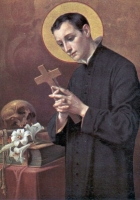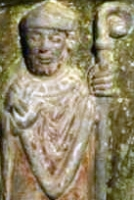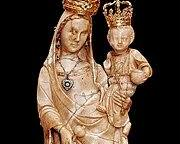St. Aaron
Feastday: June 21
Born unknown
the British Isles, exact location unknown, perhaps Wales[1]
Died after 552[2]
Saint-Malo, Brittany, France
Venerated in Catholic Church
Eastern Orthodox Church
Feast 22 June (Elsewhere)[3] 21 June (Saint Malo)
Aaron was a native of Britain. He went to Brittany, where he became a hermit on Cesabre (St. Malo) island. He attracted numerous disciples, among them St. Malo of Wales, and became their Abbot.
Aaron of Aleth (died after 552), also called Saint Aihran or Eran in Breton, was a sixth-century hermit, monk and abbot at a monastery on Cézembre, a small island near Aleth, opposite Saint-Malo in Brittany, France.[2][4] Some sources suggest he may have migrated from Celtic Britain to take up residence in Armorican Domnonia.
He lived alone near Lamballe and Pleumeur-Gautier, before finally settling on an island separated from the settlement of Aleth. He attracted many visitors while there, including Malo,[5] it is said, in 544, and became their abbot. He died soon afterwards. Malo then succeeded to the spiritual rule of the district subsequently known as Saint-Malo, and was consecrated first Bishop of Aleth. Aaron's feast day is 21 June (at Saint-Malo) or 22 June (elsewhere). He is mentioned in Les Vies des Saints de Bretagne.[6]
The town of Saint-Aaron in Lamballe, France is named after him.
Saint Aloysius Gonzaga
புனித அலோசியஸ் கொன்சாகா
இளைஞர்களுக்கு பாதுகாவலர் , துறவி
பிறப்பு
1568
மாந்துவா, இத்தாலி
இறப்பு
1591
மாந்துவா, இத்தாலி
புனிதர்பட்டம்: 1726, திருத்தந்தை 13ஆம் பெனடிக்ட்
இவர் ஓர் அரச குலத்தில் பிறந்தவர். இவரின் தந்தை, இவர் பேரும் புகழும் உள்ளவராக பிற்காலத்தில் திகழ வேண்டுமென விரும்பி, போர் வீரர்களின் தலைவராகும் பயிற்சியை அலோசியசிற்கு கொடுத்தார். ஆனால் இவரின் தாய் ஊட்டிய சத்துள்ள ஞானப்பாலின் விளைவாக பிளாரன்ஸ் நகரில் ஒன்பது வயதிலேயே மரியன்னையின் பேராலயத்தில் கற்பு என்னும் வார்த்தைப்பாட்டை இவர் எடுத்துக்கொண்டார். வாரத்தில் 3 நாட்கள் கடுந்தவம் மேற்கொண்டார். பல கடுமையான ஆன்மீக தவ முயற்சிகளையும் செய்து வந்தார். 13 வயதில் இவர் தம் பெற்றோருடன் ஸ்பெயின் நாட்டிற்கு சென்றார். அங்கே 2ஆம் பிலிப்புவின் அரச அவையிலேயே முழு நேரம் தங்கினார், அரச குல மக்களில் ஒருவராகவே நடத்தப்பட்டார். அங்கே நிலவிய சீர்கேடுகளில் சிக்காமல் இருக்க கடுமையான முயற்சிகளை மேற்கொண்டார். இவ்வேளையில் இயேசு சபையினர் இந்தியாவிற்கு சென்று நற்செய்தி பரப்பும் பணியில் ஈடுபாடு பற்றிய நூல் ஒன்று கிடைத்தது. அதை வாசித்த அவர் இயேசு சபையில் சேர எண்ணினார். இதனிடயே தன் தந்தையுடன் 4 ஆண்டுகள் பனிப்போராட்டம் நடத்தினார். இருப்பினும் மகனின் முடிவை தந்தை ஏற்க மறுத்தார். ஆனால் அலோசியஸ் இப்போரில் வெற்றி பெற்று, தனக்கு வரவேண்டிய சொத்தையெல்லாம் தன் தம்பியின் பெயரில் எழுதிவைத்தார்.
1587 ஆம் ஆண்டு இயேசு சபையில் சேர்ந்தார். பின்னர் குரு மாணவராக படிக்கும்போது, பிளேக் நோயாளிக்கு உதவி செய்து, தானும் அந்நோயால் பாதிக்கப்பட்டார். அச்சூழலில்தான் அக்கொடிய நோயால் தாக்கப்பட்டு இறந்தார். அப்போது அவரின் வயது 23. இளம் வயதிலேயே ஏராளமான புண்ணியங்களை செய்து வான்வீட்டிற்கு தயார் நிலையில் தன்னை ஆக்கிக்கொண்டார்.
இயேசு சபையில் புனிதராகவும், மறைவல்லுநராகவும் வாழ்ந்த புனித இராபர்ட் பெல்லார்மின் தான் இவரின் ஆன்ம குருவாய் இருந்தார். ஒருமுறை அலோசியசிடம் இவர் ஓர் ஆன்மா, உத்தரிக்கும் வேதனை அடையாமலேயே நேராக பேரின்பம் பெறமுடியும் என்று கூறினார். இதை கேட்ட அலோசியஸ் பரவசமடைந்தார். அந்நேரத்தில் கிறிஸ்துவின் திருவுடல், திருஇரத்த பெருவிழாவிற்கு எட்டு நாட்களுக்கு பின்னர் தான் இறக்க போவதாக உணர்ந்தாராம். அவ்வாறே "தெ தேயும்" என்ற நன்றி பாடலை இசைத்துக்கொண்டே தனது ஆன்மாவை இறைவனிடம் கையளித்தார். அலொசியஸ் தனது 23 ஆண்டுகால வாழ்வில் ஒருமுறை கூட சாவான பாவத்தில் விழவில்லை என்று அவரின் ஆன்ம குரு கூறியுள்ளார்.
Also known as
• Aluigi Gonzaga
• Lewis Gonzaga
• Luigi Gonzaga
Profile
Born to the Italian nobility who grew up in a castle, the son of Ferdinand Gonzaga, a prince in the Holy Roman Emperor and a compulsive gambler. Cousin of Saint Rudolph Acquaviva. Trained from age four as a soldier and courtier. Served as a page in the Spanish court. He suffered from kidney disease, which he considered a blessing as it left him bed-ridden with time for prayer. While still a boy himself, he taught catechism to poor boys. He received his First Communion from Saint Charles Borromeo. At age 18, Aloysius signed away his legal claim to his family's lands and title to his brother, and became a Jesuit novice. Spiritual student of Saint Robert Bellarmine. Tended plague victims in Rome, Italy in the outbreak of 1591 during which he caught the disease that killed him at age 23.
Born
9 March 1568 in the family castle of Castiglione delle Stivieri in Montua, Lombardy, Italy
Died
• 20-21 June 1591 at Rome, Italy of plague, fever, and desire to see God
• relics entombed under the altar of Saint Ignatius Church, Rome
Beatified
• 19 October 1605 Pope Paul V (cultus confirmed)
• 1621 by Pope Gregory XV
Canonized
31 December 1726 by Pope Benedict XIII
Saint Lazarus
Also known as
Lazaro
Profile
Leper mentioned by Christ in the parable of Lazarus and the rich man in the Gospel of Luke (see below).
The Order of Saint Lazarus was founded in the 12th century to provide nursing for lepers, taking Lazarus as its patron. The knights of the order were lepers, and besides helping their fellow sufferers, they carried out military duties. They founded a hospital for lepers near the northern wall of Jerusalem.
Saint Jose Isabel Flores Varela
Additional Memorial
21 May as one of the Martyrs of the Mexican Revolution
Profile
Seminarian at Guadalajara, Mexico. Parish priest at Zapotlanejo, Jalisco, Mexico in 1900. Strong and gentle father to his flock, he refused to abandon his parish during the persecutions of the Church by the government; he went into hiding, and ministered covertly to his parishioners. The mayor of Zapotlanjejo, Jose Orozco, was virulently anti-Catholic, and offered a reward for the capture of any priest. Father Jose was betrayed for this reward, and arrested; his Judas was Nemesio Bermejo, an ex-seminarian who lived with Flores.
Flores was offered his freedom if he would accept the anti-Church Calles government; he declined. Orozco turned the Zapotlanejo rectory into a jail, threw Flores into it, gave him no food or water for three days, played music outside the gaol so he could not sleep, and repeatedly offered him freedom in exchange for cooperation; Father Jose declined.
On the night he died, Jose was taken to a nearby cemetery, and tortured by being repeatedly hanged in a tree, but being lowered before he died. One of the soldiers, who had been baptized by Father Flores, refused to participate in the torture; the others shot him. They then took the padre's few possessions and murdered him. The squad tried to shoot him, but their guns would not fire, and the troop's commander, Anastasio Valdivia, cut Flores' throat. Martyr.
Born
28 November 1866 at Teul, Zacatecas, Mexico
Died
throat cut between 1am and 2am on 21 June 1927 in a cemetery near Zapotlanejo, Jalisco, Mexico
Canonized
21 May 2000 by Pope John Paul II during the Jubilee of Mexico
Saint John Rigby
Additional Memorial
25 October as one of the Forty Martyrs of England and Wales
Profile
Lancashire gentleman. Raised Protestant but converted to Catholicism. Converted others, including his father.
Imprisoned at Newgate for his faith, and for refusing to acknowledge the Queen as head of the Church. Did time with Saint John Jones. Tortured and executed by order of Justice Guady for refusing to attend Protestant services. One of the Forty Martyrs of England and Wales.
As part of the paperwork before his execution, he was asked his marital status. John replied he was "both a bachelor and a maid," the latter apparently referring to his job as a servant in the household of the avid Protestant Sir Edmund Heddleston.
Born
1570 at Harrack Hall, Wigan, Lancashire, England
Died
• 21 June 1600 at Southwark, London, England
• his body was chopped up and scattered around Southwark
Canonized
25 October 1970 by Pope Paul VI
Saint Leutfridus of La-Croix
Also known as
Leofred, Leufroi, Leufroy, Leutfred, Leutfrid, Lieffroy
Profile
Born to the nobility of Évreux, France. Brother of Saint Agofredus. Studied at Condat and Chartres in France. Teacher of young boys at Evreux, France. Spiritual student of Saint Sidonius of Saint-Saens. Benedictine hermit at Cailly and at Rouen in France. Founded La Croix-Saint-Ouen abbey (later called Saint-Leufroy in his honour) c.690, and served as its first abbot. Legend says that he used prayer to extinguish a fire that threatened to destroy his monastery.
Born
late 7th century near Évreux, France
Died
• 21 June 738 of natural causes
• miracles reported at his tomb, which became a place of pilgrimage
• relics enshrined in the La Croix-Saint-Ouen monastery church in 851
• relics enshrined in the church of Saint-Leufroy in Thiveryny, Oise, France
Saint Raymond of Barbastro
Also known as
• Raymond of Roda
• Ramon II
Profile
Augustinian canon regular at the monastery of Saint-Antonin de Frédélas in Pamiers, France. Prior of the monastery of Saint-Sernin in Toulouse, France. Bishop of Barbastro, Aragon, Spain in 1104. Very active in his diocese, constantly travelling to visit parishes, caring for his priests, encouraging the faith in the laity, living simply and giving charity lavishly. Exiled by force from 1116 to 1119 for preaching aginst the use of Christian armies against the foes of Christendom.
Born
in Durban-sur-Arize, diocese of Toulouse, France
Died
• 1126 at Barbastro, Spain of natural causes
• buried in objects from his bishopric preserved in Roda de Isábena, Huesca, Spain
Blessed Nicholas Plutzer
Profile
Born to the nobility. During a feast, Nicholas became drunk, then beligerent, and then beat up a guest. Knowing the punishment that would follow, he hid and when he thought he had been found, he pleaded for mercy and promised repentance; he then looked up to see that he had been found by a vision of Saint Norbert of Xanten who protected Nicholas by wrapping him in his cloak. Accepting the vision, Nicholas joined the Norbertines and made his vows in 1628. Canon on the Stahov monastery just outside Prague, Bohemia (in the modern Czech Republic). Novice master. Noted preacher and orator who would speak at two churches each day to large crowds. Prior of his monastery. Developed a great devotion to the Blessed Virgin Mary. Dean of the convent at Doksany in 1649.
Born
early 17th century Bohemia (in the area of modern Czech Republic)
Died
1654 of natural causes
Saint Alban of Mainz
Also known as
• Albano di Magonza
• Albinus of Mainz
Profile
Priest. Worked with Saint Ursus. The two fled Naxos, Greece to Naples, Italy to escape Arian persecution. Saint Ambrose of Milan sent them on to Gaul and Germany to evangelize the pagans there. Ursus was killed on the way, but Alban continued to Mainz, Germany. He became famous as a preacher, converting many, and opposing Arianism. Martyred by invading Vandals.
Born
Greek or Albanian (sources vary)
Died
• c.400 by pagan Vandals at Hanum, Germany
• his body was beheaded post-mortem
Blessed Jacques-Morelle Dupas
Profile
Priest in the diocese of Poitiers, France. Imprisoned on a ship in the harbor of Rochefort, France and left to die during the anti-Catholic persecutions of the French Revolution. One of the Martyrs of the Hulks of Rochefort.
Born
10 November 1754 in Ruffec, Charente, France
Died
21 June 1794 aboard the prison ship Deux-Associés, in Rochefort, Charente-Maritime, France
Beatified
1 October 1995 by Pope John Paul II
Saint Ralph of Bourges
Also known as
Raoul, Rodolphe, Radulphe, Rudolphe, Radulfo, Rodolfo
Profile
Born to the French royal family, the son of the count of Cahors and lord of Turenne. Ralph gave up his worldly position to become a monk in 822. Archbishop of Bourges, France in 840. Founded seven monasteries and worked tirelessly to improve discipline and encourage the faith. Compiled the book Pastoral Instructions to guide the priests of his diocese.
Died
21 June 866 of natural causes
Saint Mewan of Bretagne
Also known as
• Mewan of Brittany
• Mewan of Cornwall
• Maine, Mavenus, Meen, Melanus, Mevan, Mevenno, Mevenus
Profile
Followed Saint Samson from Wales to Brittany in the sixth century, accompanied by his godson Saint Austell of Cornwall. Evangelized the Broceliande district. Founded the monastery at Parmpont, Brittany, France that was later named for him.
Died
c.617 of natural causes
Saint Demetria of Rome
Profile
Daughter of Saint Flavian and Saint Dafrosa; sister of Saint Bibiana. Following the martyrdom of her parents during the persecutions of Julian the Apostate, Demetria was arrested with Bibiana; she dropped dead before reaching her cell. Martyr.
Died
• c.363 in Rome, Italy
• relics enshrined in the church of Saint Bibiana in Rome, Italy
Blessed Juan of Jesus
Profile
Mercedarian friar at the convent of Saint Eulalia in Seville, Spain.
Saint Engelmund
Also known as
Engelmond, Ingelmund
Profile
Became a Benedictine monk at a very early age. Priest. Abbot. Missionary to Friesland, working with Saint Willibrord of Echternach.
Born
England
Died
• c.739 at Haarlem, Netherlands
• relics enshrined in Utrecht, Netherlands
Blessed Colagia
Profile
Mercedarian nun, one of the first. Great spiritual teacher to her sisters. Miracle worker.
Born
Barcelona, Spain
Died
1295 at the Mercedarian convent in Barcelona, Spain of natural causes
Saint Suibhne the Sage
Also known as
• Suibhne of Armagh
• Suibhne of Cobran
• Suibhne In-Sui
• Suibhney, Suivney, Suibne
Profile
Eighth century bishop of Armagh, Ireland for 12 to 15 years (records very).
Died
21 June 730 of natural causes
Blessed Melchiorre della Pace
Profile
Mercedarian friar and preacher who ransomed Christians enslaved by Muslims in North Africa.
Saint Urciscenus of Pavia
Also known as
Ursicino
Profile
Bishop of Pavia, Italy, from c.183 until his death, serving for 33 years. He led his see during a turbulent period of persecution and growth.
Died
216 of natural causes
Saint Agofredus
Profile
Brother of Saint Leutfridus. Holy Cross Benedictine monk. Known throughout Normandy, France, for his holiness.
Died
738 of natural causes
Saint Terence
Also known as
Terentius
Profile
First century bishop of Iconium. May have been the Terius mentioned by Saint Paul the Apostle in Romans 16:22. Martyr.
Saint Corbmac
Also known as
Cormac
Profile
Sixth century spiritual student of Saint Columba. Appointed abbot of Durrow monastery by Columba.
Saint Martin of Tongres
Profile
Bishop of Tongres in modern Belgium. Apostle of the Hesbaye district, in Brabant.
Saint Dominic of Comacchio
Profile
Monk at Comacchio near Venice, Italy.
Died
c.820
Saint Rufinus of Syracuse
Profile
Martyr.
Died
Syracuse, Sicily, date unknown
Saint Martia of Syracuse
Profile
Martyr.
Died
Syracuse, Sicily, date unknown
Saint Apollinaris of Africa
Profile
Martyr.
Saint Cyriacus of Africa
Profile
Martyr.
Martyrs of Taw
Profile
Three Christians of different backgrounds who were martyred together – Moses, Paphnutius, Thomas
Died
beheaded in Taw, Egypt, date unknown
Madonna of the Miracles
The Madonna of the Miracles refers to a venerated statue of the Virgin Mary associated with miracles, particularly in the town of Alcamo, Italy.
There are two main traditions associated with the Madonna of the Miracles:
Alcamo, Italy: Here, the Madonna of the Miracles is the patron saint of the town. The tradition dates back to June 21, 1547, when according to local belief, several women washing clothes in a stream north of Alcamo witnessed an apparition of the Virgin Mary and child. Following this, a statue of the Madonna was discovered and attributed with miraculous healings, leading to the construction of a sanctuary to house the statue.
Virgin of Miracles, Spain: Another Virgin of Miracles is a statue depicting the Virgin Mary in the La Rábida Monastery in Palos de la Frontera, Spain. This Gothic statue, carved from alabaster, dates from the 13th or 14th century. It is significant for its connection to Christopher Columbus and his voyages of discovery, as it is believed to have been prayed to by Columbus and his crew before their expeditions to the Americas.
















கருத்துகள் இல்லை:
கருத்துரையிடுக